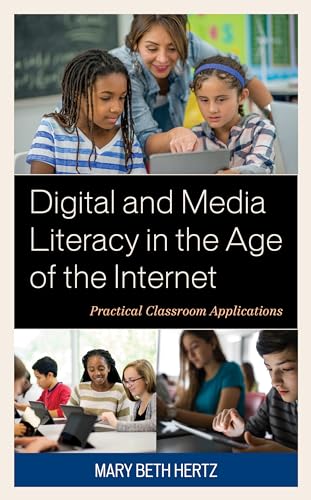Digital and Media Literacy in the Age of the Internet
Practical Classroom Applications
MARY BETH HERTZ
BOOK REVIEW

Digital and Media Literacy in the Age of the Internet: Practical Classroom Applications is not just a book; it's a clarion call in a world where information is as abundant as it is volatile. In our age, where digital spaces shape beliefs, behaviors, and societal norms, Mary Beth Hertz emerges as a beacon of clarity and wisdom, helping educators navigate these turbulent waters. This work is a highly relevant tool for anyone who has felt overwhelmed by the sheer volume and complexity of the digital landscape that today's students traverse daily.
As the internet continues to seep into every nook and cranny of our lives, the question becomes: how do we equip future generations to not just survive, but thrive in a world inundated with information? Hertz meticulously addresses this pressing concern. Her insights unravel how media literacy is not merely about consuming content but about empowering students to critically evaluate the information that bombards them from all directions. This book serves as both a guide and a powerful manifesto on fostering a culture of inquiry and discernment in educational settings.
Delving into the core of Hertz's work reveals a passionate commitment to fostering critical thinking among learners. She illustrates practical applications that teachers can implement in their classrooms to transcend rote learning and encourage active engagement with media. From understanding bias in reporting to recognizing misinformation campaigns, each chapter presents tools and strategies that can transform even the most traditional learning environments into dynamic, inquiry-driven spaces.
Readers often rave about the applicability of Hertz's ideas. The flood of positive reviews indicates a widespread recognition of the necessity for educators to adapt and incorporate these principles into their curricula. However, there are dissenting voices, too. Critics argue that some of her suggestions may be too idealistic given the constraints of standardized testing and rigid curricula. Yet, isn't that the point? Hertz challenges us to push back against the status quo, to think beyond what is convenient and to strive for a richer educational landscape.
In reflecting on her background, it's clear Hertz brings her own experience into this work. As an educator and advocate for technology in the classroom, she speaks from a place of authenticity and urgency. Hertz understands that educators are not merely purveyors of information; they are sculptors of the future. In an era where misinformation can propagate faster than the truth, her work stands as a vital reminder of the educator's role in shaping not just knowledgeable students, but informed citizens.
Moreover, the historical context in which this book was written enriches its message. Released in 2019, the work resonates with the zeitgeist of a digital revolution fraught with challenges. Misinformation, fake news, and the rise of polarized content have sparked concerns that echo through every corner of society. Hertz acknowledges that the fight for media literacy is not just a battle fought in classrooms but a collective societal endeavor, one that requires effort from parents, educators, and policymakers alike.
Ultimately, Digital and Media Literacy in the Age of the Internet compels us to reconsider the frameworks through which we educate our youth. It promises not merely knowledge but transformation-an evolution of thought processes that could ripple outwards, influencing communities and society as a whole. This book isn't just essential for educators; it's a crucial read for anyone who wishes to understand and navigate our complex information landscape.
In a world where the clarity of one's judgment can be the difference between enlightenment and ignorance, Hertz's work is a clarifying lens. This book prompts you to reflect, to question, and ultimately to act. The insights contained within might just redefine your understanding of what it means to be a literate individual in the digital age. The real question, however, is this: are you ready to take the plunge into a more aware, more critical existence? 🌊
📖 Digital and Media Literacy in the Age of the Internet: Practical Classroom Applications
✍ by MARY BETH HERTZ
🧾 288 pages
2019
#digital #media #literacy #internet #practical #classroom #applications #mary #beth #hertz #MARYBETHHERTZ